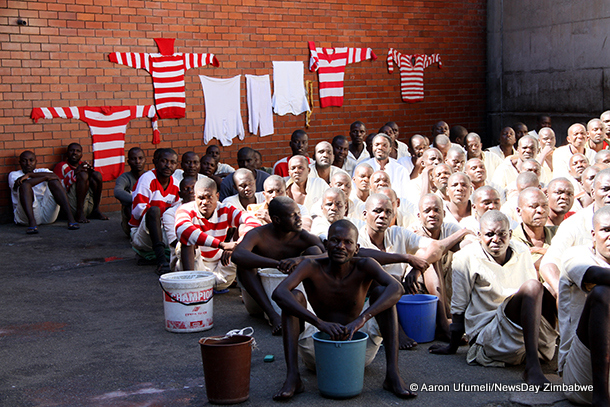
THE Zimbabwe Human Rights Commission (ZHRC) has described the situation at most of the country’s prisons as dire, with inmates experiencing an acute shortage of food, bedding, clothing, sanitation and medical drugs.
BY VENERANDA LANGA
In its 2016 annual report, which was tabled before Parliament last week by Justice minister Happyton Bonyongwe in the National Assembly, the ZHRC said a visit to nine prisons had shown that inmates were living in inhuman conditions.
“Both prisoners and prison officers confirmed that the diet is unbalanced, mainly composed of starch and vegetables, with the exclusion of protein and other essential nutrients, and food containers used for the serving of the food at most prisons were worn out and unhygienic,” the report read.
“For instance, at Mutimurefu Farm Prison, the containers were made of plastic, which is not suitable for serving hot food and these containers were cracked and some of the food was sipping out.”
The ZHRC said access to running water was different from one prison to another, with prisons in Karoi, Shurugwi and Mutare facing serious shortages of running water, while prisons in Beitbridge, Hurungwe and Kariba had constant supplies.
“The clothing, bedding and sanitation situation left a lot to be desired. Uniform shortages were a cause for concern across all prisons as prisoners were only allocated one pair per person,” the report read.
At WhaWha Young Offenders and WhaWha Medium, as well as Mutare Prison Farm, inmates were seen wearing worn-out clothes.
- Chamisa under fire over US$120K donation
- Mavhunga puts DeMbare into Chibuku quarterfinals
- Pension funds bet on Cabora Bassa oilfields
- Councils defy govt fire tender directive
Keep Reading
“Sanitary wear for female inmates was moderate at most prisons. However, female inmates indicated that they did not have sufficient undergarments,” ZHRC said.
“Female inmates also raised concern about the well-being of their children in prison. There were no facilities in place to cater for the needs of children accompanying their mothers in prison, which is detrimental to the welfare, physical and mental development of the children.
“They lacked social skills and attempts to integrate them with other children outside the prison complex exposed a lot of fear and confusion in them.”
On health facilities, the ZHRC said transport to take patients to hospital was a challenge, with most centres operating without ambulances.
“Drugs continue to be in short supply for all the prisons monitored with only the availability of painkillers such as Paracetamol.”











